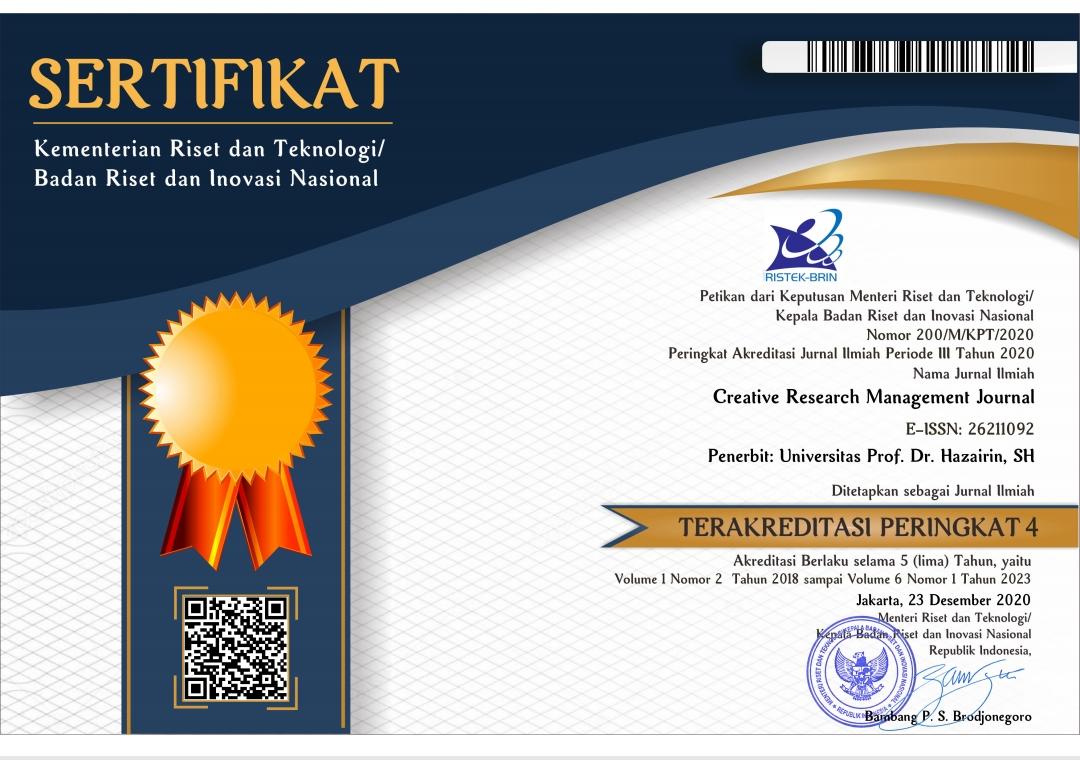PENGARUH KOMPENSASI MANAJEMEN, DAN KESULITAN KEUANGAN TERHADAP TAX AVOIDANCE
DOI:
https://doi.org/10.32663/crmj.v4i2.2244Keywords:
Management Compensation, Financial Distress, Tax AvoidanceAbstract
This study aimed to examine the effect of management compensation and financial distress on tax avoidance with profitability and company size as a control variable. This research was a quantitative descriptive employed a correlation design. The population were the manufacturing companies listed on the Indonesia Stock Exchange 2018-2020 period. The sample were determined by using puposive sampling method which selected 204 companies as the sample of the study. The data were analyzed by using statistical testing of multple linear regression with a significance level of 5%. The results showed that the managamenet compensation had no effect on tax avoidance while the financial distress have a positive effect on tax avoidance. The profitability of control variables and firm size had no effect on tax avoidance. Thus, it can be concluded that management compensation had no effect on tax avoidance while financial distess had effect on it.
References
Arifiyani, H. A., & Sukirno, S. (2012). Pengaruh Pengendalian Intern, Kepatuhan Dan Kompensasi Manajemen Terhadap Perilaku Etis Karyawan (studi Kasus Pt Adi Satria Abadi Yogyakarta). Nominal: Barometer Riset Akuntansi Dan Manajemen, 1(2), 1–21. https://doi.org/10.21831/nominal.v1i2.995
Armstrong, C. S., Blouin, J. L., & Larcker, D. F. (2012). The incentives for tax planning. Journal of Accounting and Economics, 53(1), 391–411. https://doi.org/10.1016/j.jacceco.2011.04.001
Belkaoui, A. R. (2006). Teori Akuntansi. Salemba Empat.
Damodar, N., & Gujarati dan Dawn, P. (2009). Basic Econometric 5th Edition (5th ed.). McGraw-Hill International Edition.
Dyreng, S. D., Hanlon, M., & Maydew, E. L. (2010). The Effects of Executives on Corporate Tax Avoidance. The Accounting Review, 85(4), 1163–1189. https://doi.org/10.2308/accr.2010.85.4.1163
Fahmi, I. (2013). Analisis Laporan Keuangan. Alfabeta.
Hanafi, U., & Harto, P. (2014). Analisis Pengaruh Kompensasi Eksekutif, Kepemilikan Saham Eksekutif Dan Preferensi Risiko Eksekutif Terhadap Penghindaran Pajak Perusahaan. Diponegoro Journal of Accounting, 3(2), 1162–1172.
Jensen, M. C., & Meckling, W. H. (1976). Theory of the firm: Managerial behavior, agency costs and ownership structure. Journal of Financial Economics, 3(4), 305–360. https://doi.org/10.1016/0304-405X(76)90026-X
Lanis, R., & Richardson, G. (2011). The effect of board of director composition on corporate tax aggressiveness. Journal of Accounting and Public Policy, 30(1), 50–70. https://doi.org/10.1016/j.jaccpubpol.2010.09.003
Meilia, P., & Adnan, A. (2017). Pengaruh Financial Distress, Karakteristik Eksekutif, Dan Kompensasi Eksekutif Terhadap Tax Avoidance Pada Perusahaan Jakarta Islamic Index. Jurnal Ilmiah Mahasiswa Ekonomi Akuntansi, 2(4), 84–92.
Nugroho, S., & Darsono, D. (2015). Pengaruh Kompensasi, Kepemilikan Manajerial, Diversifikasi Perusahaan Dan Ukuran Kap Terhadap Manajemen Laba (studi Empiris Pada Perusahaan Manufaktur Yang Terdaftar Di Bursa Efek Indonesia Tahun 2011-2013) [Other, Fakultas Ekonomika dan Bisnis]. http://eprints.undip.ac.id/46188/
Nurfauzi, R., & Firmansyah, A. (2018). Managerial Ability, Management Compensation, Bankruptcy Risk, Tax Aggressiveness. Media Riset Akuntansi, Auditing & Informasi, 18(1), 75–100. https://doi.org/10.25105/mraai.v18i1.2775
Putri, R. A. H., & Chariri, A. (2017). Pengaruh Financial Distress Dan Good Corporate Governance Terhadap Praktik Tax Avoidance Pada Perusahaan M Anufaktur. Diponegoro Journal of Accounting, 6(2), 56–66.
Reinganum, J. F., & Wilde, L. L. (1985). Income tax compliance in a principal-agent framework. Journal of Public Economics, 26(1), 1–18. https://doi.org/10.1016/0047-2727(85)90035-0
Rohatgi, R. (2002). Basic International Taxation. Kluwer Law International.
Sari, D. (2018). Ownership Characteristics, Corporate Governance, and Tax Aggressiveness.
Septriadi, D., & Septriadi, D. (2019). Membatasi Kekuasaan Untuk Mengenakan Pajak. Grasindo.
Taufiqurokhman. (2014). Kebijakan Publik: Pendelegasian Tanggung Jawab Negara Kepada Presiden Selaku Penyelengara Pemerintahan. Fakultas Ilmu Sosial dan Ilmu Politik Universitas Moestopo Beragama.
Winarno, B. (2007). Kebijakan Publik?:Teori dan Proses. Med Press.














